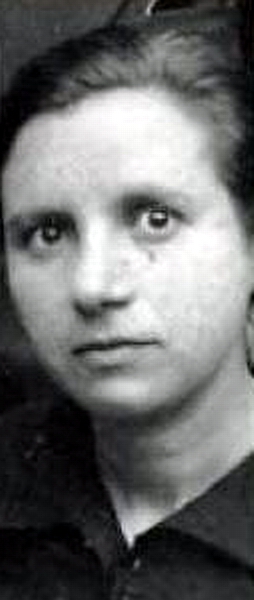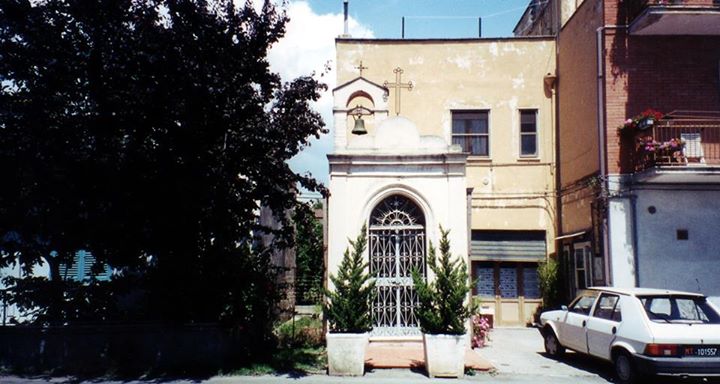The Holy Teacher of Tinchi
March 20, 2015
Like all new teachers in Caporotundo, outside of Tinchi,
she went to live with the Panetta family. The other teachers remained there
a few days or weeks, but Angelina remained permanently for almost 10 years.
She was a true member of the family. She loved and she was loved in return.
“The heart to Miss! The heart to Miss!” would shout
the youngest child at the dinner table when the pulpy center of the watermelon
was served. Her eyes of shining black were filled with tears. She thought
perhaps of the little brothers back in distant Sicily.
One of the young men in the house joked about Garibaldi
annexing Sicily to Italy. Again her beautiful eyes filled with tears. Her
loved ones were always at her heart. Her father was a pharmacist, her mother
a teacher. They were poor. She was the eldest of two sisters and two brothers.
Her meager income was intended for family and some good work. She lived
on what they brought in exchange for her extraordinary work, private schooling,
sewing, inoculations for the sick. They brought something as an expression
of sympathy, because she did not ask for anything. These offerings consisted
of some eggs, some vegetables.
She lived frugally. She was tall, strong, robust, dark
colored like a mountain. She soon captivated the sympathy of the population,
which at the time was very poor. This young teacher in her early twenties
quenched herself in the school hours set by the program. The good teacher
patiently repeated the lessons to the individuals in the hours they were
free from working, and so she was always available to everyone.
She visited, one by one, all the families. She became
familiar; popular, to all. ‘Mother Seppa, sister Angela, brother Titto”
so she would call the farmers in the districts. Later she came to be called
“Godmother” because she went in search of unbaptized children and took
them herself, offering to be Godmother, for the baptism.
For decades this was mission land. The poor were engulfed
in farm work and went to town only on special occasions: Christmas, Holy
Thursday, and Easter. Religion was something they were almost unaware of,
learning the basics on the knees of their mothers. All were illiterate.
One story often related was of a young man working
in the late evening at the home of the parish priest. He was soon to be
married and the priest took to lecture him. The young man, who had removed
his jacket and was laboring hard, turned and pleaded with the priest: “Father,
I come to you to plant trees in the square in front of the church, but
spare me the prayers”.
Things changed with the appointment of the young teacher.
In winter, inside the small school that had been a stable (so dear to her
because it reminded her of the stable in Bethlehem); in summer, out in
the open, the young teacher taught her catechism lessons. It was beautiful
and moving to see the young, tired, sweating, covered in dusty robes, sitting
in the moonlight listening, hanging on every word of the good teacher,
with a voice sweet, persuasive, that entertained them for hours.
In the early years she would travel twelve miles on
foot to listen to Mass. She would go straight to the church and return
home to her adopted family, where she would make herself available and
useful to anyone who approached her. Later, wanting to share the joy of
the Holy Mass with her peasant friends, she invited the parish priest at
the time; Don Vincenzo Di Giulio, to give service at the stable-school.
 Malaria
and sickness was everywhere. One day the Priest Di Giulio saw her dismay
at not being able to peal the school bell, scolded her saying “Miss, think
of your health and let stand the bell”. He saw the first signs of decay
in the dear girl. She was loved by all in Pisticci that remember. “Oh,
Miss LoDico, that holy creature! Every time you step in front of that chapel,
it evokes the memory of how many stones were transported” said the
lady of the notary Lazazzera. The malaria and tuberculosis raged on. An
old man whose name escapes me laid motionless in a bed for twelve years.
She often visited him and comforted him. She called him uncle.
Malaria
and sickness was everywhere. One day the Priest Di Giulio saw her dismay
at not being able to peal the school bell, scolded her saying “Miss, think
of your health and let stand the bell”. He saw the first signs of decay
in the dear girl. She was loved by all in Pisticci that remember. “Oh,
Miss LoDico, that holy creature! Every time you step in front of that chapel,
it evokes the memory of how many stones were transported” said the
lady of the notary Lazazzera. The malaria and tuberculosis raged on. An
old man whose name escapes me laid motionless in a bed for twelve years.
She often visited him and comforted him. She called him uncle.
A reaper Lecce became ill with a fever. Without thinking
twice she put him in her bed while she slept on the benches of the school
in the next room. When I wanted to make her understand she had committed
an indiscretion, she looked at me in wonder. With a sweet face, so serene
it seemed to say “might not Jesus be in that one so sick?”
Her sister Mary and brother Peppino had succumbed to
tuberculosis. I had always suspected that she had imported this evil sickness
into her home now even as she stood above her bed comforting that young
man.
She wrote often to her uncle, the priest Luigi Immordino,
back in Marianopoli, Sicily. She really believed her school was a temple.
He wrote of telling a lie and burning a finger with a candle as repentance.
She jokingly replied “you should burn the tongue, as the finger is not
to blame”.
She was forced to leave and to return to Marianopoli
where her condition worsened. She was only 33 years old. She died, in the
scent of sanctity, her pain, comforted by the company of relatives and
friends, at 4.00 in the night between 4th and 5th of November in the year
1932.
On the side of the chapel she built in Tinchi, carved
on a tombstone reads the following inscription:
Within these strong walls
forever dear and honored is
the name Angelina LoDico
For nine years teacher and mother
her pupils and the villagers of Caporotundo
remember her favors and her virtue
Within this chapel erected
because of her zeal
we implore God on her behalf
Shine always and be ever in the light
of the glory of the heavens
Testimony of Teresa Panetta (Collected by Father Bartolomeo
Bardessono) - Archive Parish of Our Lady of Mount Carmel Tinchi
Translated & edited by Michael LoDico 3/20/2015

Cappella LoDico - Tinchi, Italy

 Malaria
and sickness was everywhere. One day the Priest Di Giulio saw her dismay
at not being able to peal the school bell, scolded her saying “Miss, think
of your health and let stand the bell”. He saw the first signs of decay
in the dear girl. She was loved by all in Pisticci that remember. “Oh,
Miss LoDico, that holy creature! Every time you step in front of that chapel,
it evokes the memory of how many stones were transported” said the
lady of the notary Lazazzera. The malaria and tuberculosis raged on. An
old man whose name escapes me laid motionless in a bed for twelve years.
She often visited him and comforted him. She called him uncle.
Malaria
and sickness was everywhere. One day the Priest Di Giulio saw her dismay
at not being able to peal the school bell, scolded her saying “Miss, think
of your health and let stand the bell”. He saw the first signs of decay
in the dear girl. She was loved by all in Pisticci that remember. “Oh,
Miss LoDico, that holy creature! Every time you step in front of that chapel,
it evokes the memory of how many stones were transported” said the
lady of the notary Lazazzera. The malaria and tuberculosis raged on. An
old man whose name escapes me laid motionless in a bed for twelve years.
She often visited him and comforted him. She called him uncle.

